A brief biography
Eduardo Bonnín Aguiló was born in Palma de Mallorca (Spain) on May 4, 1917, in his family’s residence, located in the heart of Plaza España. He grew up in a Catholic family dedicated to the trade and semi-wholesale export of grains and dried fruits.
He was the second of ten children born to Fernando Bonnín Piña and Dr. Mercedes Aguiló Forteza.
His early education took place at the French School and La Salle College. His intellectual formation was shaped by the Augustinian Fathers and, most importantly, by private tutors hired by his parents at their home.
However, Eduardo always said that his first teacher was his grandfather Jorge, who instilled in him a love for reading. Eduardo was convinced that "nothing influenced me as much as my stubborn and ever-growing interest in reading."
In 1936, he had a life-changing experience: compulsory military service. At the same time, two contrasting sources of knowledge entered his life—reality, through direct contact with secular men in the battalion, and idealism, through his books.
Providentially, Eduardo came across a speech given by Pope Pius XII to parish priests and Lenten preachers in Rome on February 6, 1940. The Holy Father urged the search for "new" and different paths from the usual ones to help everyone—especially those far from the Church—experience God's love.
From this concern, Eduardo developed a text called the "Study of the Environment."
Three fundamental principles became the core of his thinking: Christ, Friendship, and the Person, especially those distant from the Church.
Although he was not yet part of Catholic Action, Eduardo was invited to the first "Cursillos for Advanced Pilgrims," aimed at inspiring young people to embark on a pilgrimage to Santiago de Compostela. However, he declined the invitation, as he was not drawn to the group's way of being and acting.
José Ferragut persuaded Eduardo to attend the second "Cursillos for Advanced Pilgrims," held in 1943 at the Lluch Sanctuary. There, Eduardo observed a cheerful and open-minded spirit among the young participants, which convinced him. However, he believed that the preparation should not be solely for the pilgrimage to Santiago but for life itself.
The crucial moment in the genesis of the Cursillos de Cristiandad came shortly after Holy Week in 1943 when Eduardo connected his experience in the Pilgrims' Cursillo with his deep personal concerns and his interactions with secularized environments. He concluded that something both similar and different from the Pilgrims' Cursillo could ignite a Christian dynamism—not just for a specific event like the Santiago pilgrimage, but for everyday life in real and concrete environments.
That same year, in 1943, Eduardo publicly presented his "Study of the Environment" at the Diocesan Seminary of Mallorca.
In this context, and applying his Study of the Environment to real life, Eduardo developed a method based on his experience in the Pilgrims' Leaders Cursillo—one that would serve to Christianize distant individuals and environments while also revitalizing those already close.
A turning point came in 1944 when Reverend Sebastián Gayá invited Eduardo to present his study at the "School of Propagandists" which Gayá directed. Eduardo's presentation introduced what would become the key theme of his method—later integrated into the "Beyond the Cursillo" talk.
The First Cursillo, following Eduardo’s framework, was held in a “chalet” in Cala Figuera de Santanyí, Mallorca (Spain), from August 19 to 23, 1944.
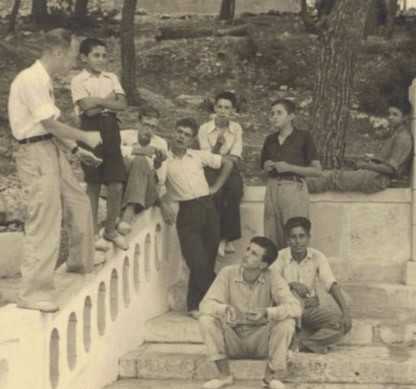
The Spiritual Director of this first-ever Cursillo de Cristiandad was Reverend Juan Juliá, with Eduardo Bonnín serving as “rector” and Jaime Riutort and José Ferragut as “professors.”
That gathering already contained all the essential elements of the Cursillo de Cristiandad, except for the first and last topics discussed, which would not be definitively integrated into the method until the 1950s.
Eduardo often stated that, from this Cursillo in Cala Figuera onwards, he continued to use the same frameworks and materials in all subsequent Cursillos, ensuring that the original was entirely authentic.
The Second Cursillo de Cristiandad took place at the Sanctuary of San Salvador in Felanitx, also in the southern part of the island, in September 1946. The Spiritual Director was again Juan Juliá, with Eduardo Bonnín as rector and Antonio Ruíz and Guillermo Estarellas, two youth leaders from Catholic Action, as professors.
At the closing ceremony of the 1946 Cursillo, Diocesan Chaplain Mr. Dameto was present, marking the first official recognition of the new system by the diocesan Church.
The Third Cursillo in history was held from April 16 to 20, 1947, under the spiritual direction of José Estelrich, with Eduardo Bonnín as rector and a single professor, José Seguí.
In 1948, two Cursillos were conducted using the new method, both held close in time. The first took place during Holy Week, with the spiritual retreat led by Father Amengual, while Father Bartolomé Nicolau served as the Spiritual Director. José Ferragut acted as rector, with Eduardo Bonnín, Bartolomé Riutort, and Juan Mir as his team of professors.
The next Cursillo was held in April 1948, with shared spiritual direction by José Estelrich and Miquel Sastre, Eduardo Bonnín again as rector, and Onofre Arbona and Antonio Salvá as professors.
The Cursillos de Cristiandad officially began in August 1944 but were formally recognized and numbered starting with the one held on January 7, 1949, at the hermitage of San Honorato. This “Cursillo No. 1” had Guillermo Payeras as Spiritual Director and Eduardo Bonnín as rector.
The rapid growth in 1949 prompted Eduardo to reflect deeply to ensure that the influx and large number of participants would not hinder the consolidation of friendship groups, which he had considered since 1944 as the most essential element of the post-Cursillo process. This reflection quickly led to the methodological design of the “group reunion.”
The 1949 annual assembly, held in November, included a presentation on Groups, which definitively settled the matter by incorporating the weekly group reunion as a specific and essential part of the method.
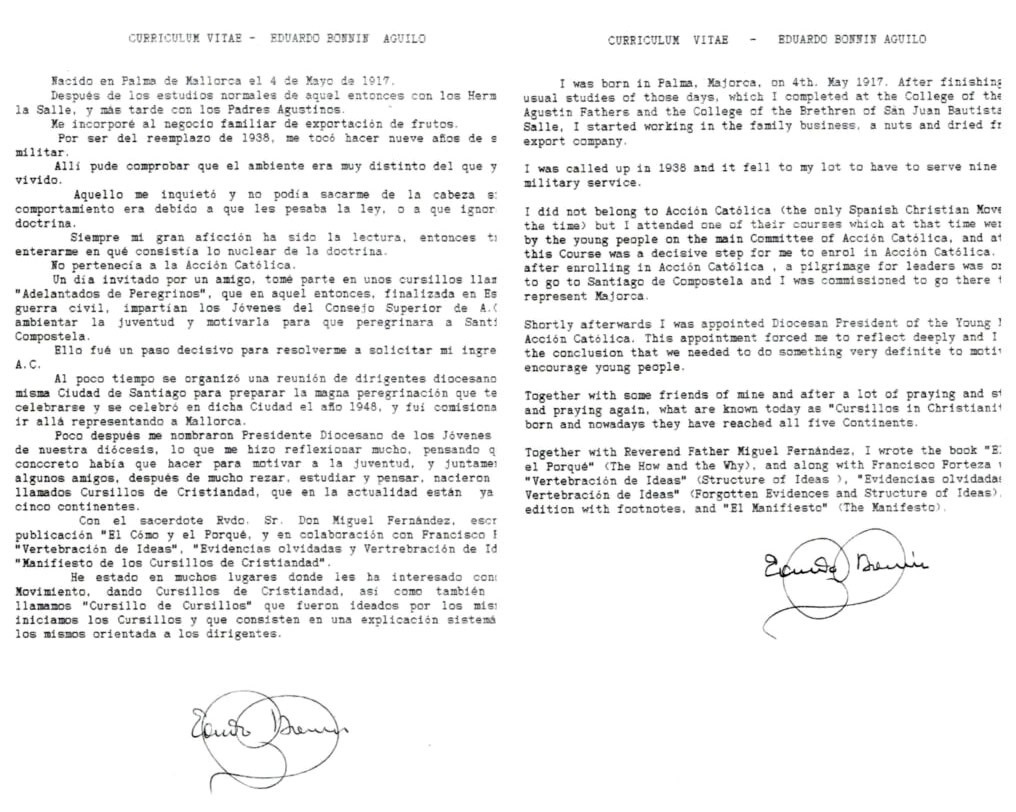
The seed of Cursillos has spread across the world, and Eduardo followed its growth, fertilizing and fermenting the environments where it was called to thrive. “I don’t have an odometer on my feet” was something Eduardo liked to say, avoiding recounting his international travels and downplaying the significance of having proclaimed the Gospel worldwide. Eduardo visited China three times. In 1966, he traveled to Brazil, New York, and Peru; in 1967, to Bolivia, Costa Rica, and Miami, and participated in the Third National Leaders’ Gathering in Guadalajara. On May 4, 1968, he attended the Ultreya in Fatima. In 1998, after a decade, he returned to Chile, reaching Tuvulú, Santiago, Valparaíso, and Temuco. That same year, he also traveled to Bolivia, Guatemala, Mexico, and visited Ravenna and Padua.
In all five continents, there is evidence of the growth and transformation brought about by this seed. After a lifetime devoted to the love of God and people, always content but never satisfied, as he used to say.
On February 6, 2008, Eduardo passed away. He was buried in the Church of the Capuchins, and his tomb bears the inscription of what he always said he was: An Apprentice of Christ.
Eduardo's travels
These are some of the countries visited by Eduardo Bonnín Aguiló in his eagerness to spread the message that God loves us and to share the method of the Cursillo Movement to communicate this wonderful news in the best possible way: through friendship.
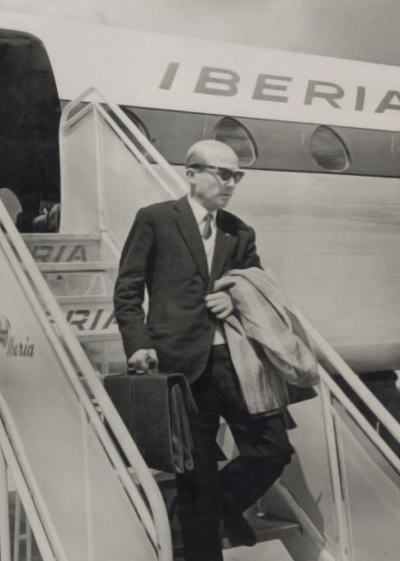
- Germany (june 1976, april 1997, october 2001).
- Angola (july 1973).
- Argentina (october 1981, november 1991, august 1992, may 1993, november 1994).
- Australia (september 1991, september 1998).
- Austria (december 1971, september 1974, october 1992).
- Bolivia (april 1998).
- Brazil (july-august 1966).
- Canada (january 1992, july 1992, july 1993, april 1994, april and september 1995, may 1996).
- Chile (august 1988, april 1998).
- China (july 1998).
- Colombia (august 1968).
- South Korea (april-may 1972, september 1992, october 1997).
- Costa Rica (july 1978).
- Ecuador (july 1995).
- El Salvador (july-august 1966, january 1992, august 1993, july 1996).
- Scotland (july 1995).
- United States (august-september 1961, may 1962, july-august 1966, july 1971, may 1983, may 1988, january and april 1991, may and july 1992, april 1993, april and september 1994; august, september, and october 1995; february, march, and june 1996; march, april, may, june, and december 1997, july-august 1998).
- Philippines (april-may 1972, october-november 1995).
- Guam (october 1996).
- Guatemala (may 1985, july 1996, june 1998).
- Honduras (july 1993, july 1996).
- Hungary (november 1997).
- England (june 1990, july 1995).
- Italy (october 1955, may 1966, april 1985, september 1986, october 1991, september 1992; april, november, and december 1993, june 1994, may and december 1995, september and november 1996; february, september, and october 1997, may and september 1998, november 1999).
- Ireland (june 1978, september 1994, july 1997).
- Japan (april-may 1972).
- Macau (april-may 1972).
- Mexico (may 1962, august 1963, 1970, september 1980, january and november 1992, march and september 1994, january 1995, november 1996, august 1998).
- Nicaragua (february 1972, july 1996).
- Panama (august 1993).
- Peru (july-august 1966).
- Portugal (february 1981, april 1982, april 1983, january 1997, february 1998).
- Puerto Rico (august 1990).
- Dominican Republic (july 1980).
- Thailand (september 1993, october 1994).
- Taiwan (april-may 1972, november-december 1982).
- Venezuela (june 1976, july 1988).
Diaries: Eduardo’s Personal Journals
FEBA is the custodian of a treasure of incalculable value: the personal journals of Eduardo Bonnin Aguiló, written by his own hand between the years 1943 and 2007. A jewel that holds the intimacy of a man of God.
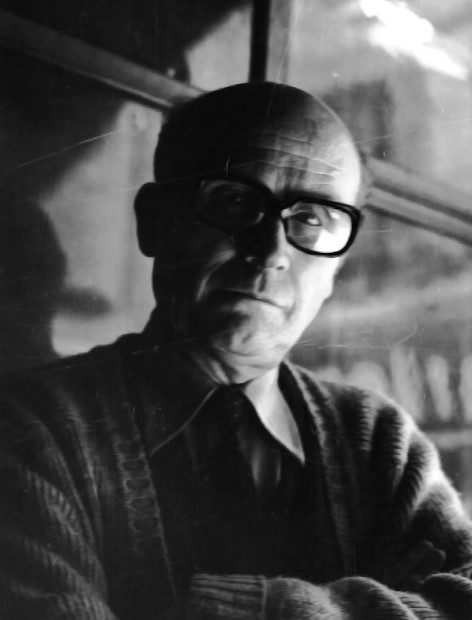
These journals do not explicitly contain Eduardo’s thoughts, but through them, we can see how he put into practice the mindset of Fundamental Christianity. In them, we observe Eduardo’s way of being and how he used all his understanding and all his resources to forge his thoughts, dedicating his time to reading and engaging with friends and leaders of his time, with whom he enjoyed sharing his concerns, plans, and projects.
Step by step, Eduardo walked the path toward the will of the Lord, traveling through the streets of Palma and the towns of Mallorca and the entire world.
We are before the invaluable testimony of the tireless daily work of a Saint.
His way of expressing himself is very unique. He uses his native language, the Mallorcan of his time, filled with genuine expressions that characterize him so well: “Ja ho val!”, “La mala hora!”.
In his journals, we can savor his authenticity—the 100% genuine Eduardo. We find heartwarming memories and friendships forged through endless comings and goings. A tireless urban walker. A humble neighborhood pilgrim.
A reflection of an intense life, both earthly and spiritual, filled with intimate moments with the Lord, on whom he constantly relied and with whom he loved to converse. We see his closeness and absolute trust in Him: “En Vos confii.” “Vos Dictau.” A whole declaration of intent from someone who, every day, surrendered his will, time, and direction in service of the Lord. A tireless seeker of God’s will.

The ultimate expression of holiness made ordinary, and of ordinariness made holy.
Eduardo’s journals allow us to relive his daily life, to accompany him to his daily Mass and to buy books, to visit his friends and the most relevant figures of the ecclesial sphere of his time, and to prepare for and attend meetings—some fascinating, some incredibly tedious.
Ultimately, they immerse us in an era without mobile phones or social media, where we can step into Eduardo’s living room and his “kitchen,” where everything was simmered with great care and dedication—the “Menu” offered in the Cursillos of Mallorca.
It is like watching the movie of his life from the front row—the life of a saintly man who, through simplicity and normalcy, gave a new meaning to the word friendship, elevating it to the transcendent, to levels never before reached. A friendship so rich in nuances that it has served as a bridge for hundreds of thousands of people to reconnect with the Lord and with one another.
The material contained in the personal journals reveals just how normal and saintly Eduardo was, testifying to how he cultivated his ability for conviction, decision-making, and perseverance.
There is so much in the journals, and what they contain is so true, that it is easy to see the Lord’s outstretched hand accompanying Eduardo’s steps throughout his long life.
Anyone who delves into the experiences described in the journals cannot help but be captivated by the charm of a unique man who gave everything to follow an intuition inspired by the Spirit—an inspiration that, even today, continues to be a blessing whenever two or more gather in the name of Jesus Christ.
De colores.
In Memoriam: february 6, 2008
Below, we transcribe the note that we published on this same website when Eduardo passed away:
Dear Cursillista friends:
At this moment, our hearts must beat with the feeling and the certainty that Love is stronger than death.
Eduardo Bonnín Aguiló, Founder of the Cursillos in Christianity Movement, but above all, our teacher, brother, and friend, has gone to meet the Father. Today, on the 6th, at 4:00 p.m., Eduardo passed away knowing that God loves him, believing in the resurrection, and, as always, happy, though never satisfied.
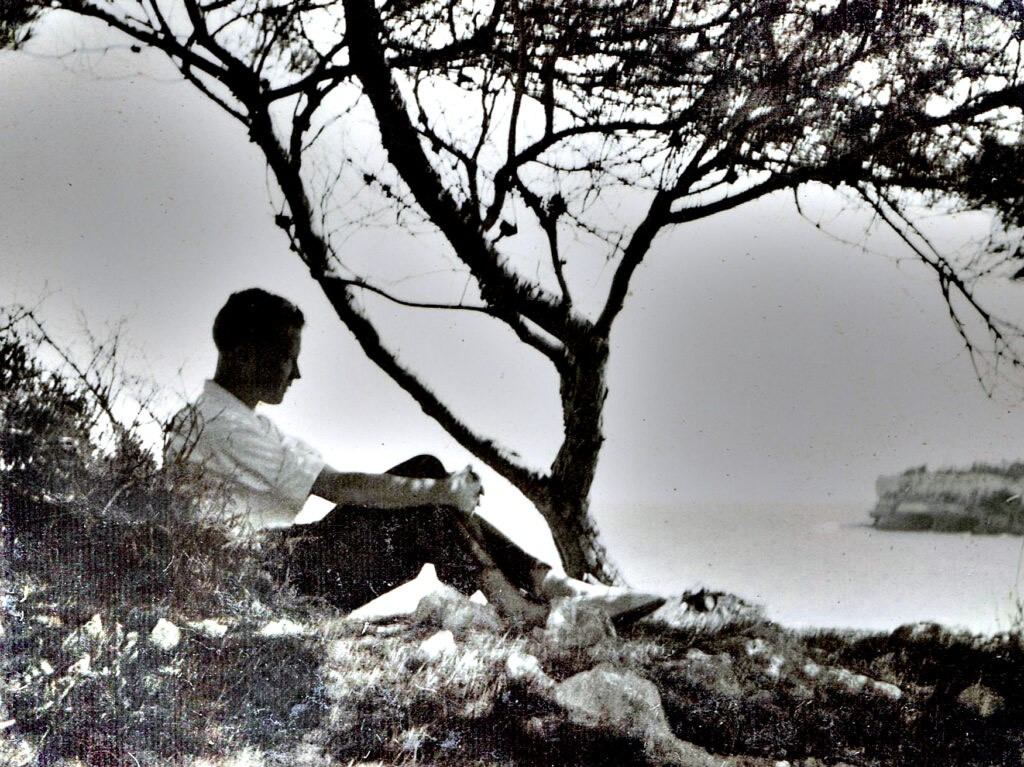
Faithful to the Gospel of Christ, open to the reality of the world, and attentive to the people around him throughout his life, he has left behind a legacy of friendship with God and with men through the Cursillos in Christianity. Now, as sadness settles in our hearts at losing in this life someone we deeply loved, our Faith becomes present, giving us the certainty that Eduardo is now immensely happy with the Father. And that, as he himself would say, is a reason for great joy. We ask you, in order to reach as many people as possible, to share the news of his passing with all your friends, whether they are Cursillistas or not, but who knew Eduardo.
The scheduled farewell events are as follows:
- The wake will take place at Bon Sosec (Ctra Palma-Inca km 7.5 – Marratxí) on the 7th, 8th, and 9th.
- On Tuesday, the 12th, at 8:00 p.m., a solemn funeral will be held, convened by the Bonnin Family and the Diocesan Secretariat of Mallorca of the MCC, at Palma Cathedral, officiated by the Most Reverend Bishop of Mallorca, D. Jesús Murgui.
- Both at the wake and at the Cathedral, before and after the Funeral Mass, signature books will be available for anyone who wishes to leave messages of remembrance, gratitude, and comfort for the family.
- Additionally, a blog has been set up at eduardoinmemoriam.blogspot.com so that anyone who wishes may share their thoughts and memories of Eduardo, especially our brothers and sisters who are unable to be in Mallorca and are scattered across the world.
When Eduardo visited prisoners, he called them fortunate and important people because, within a few hours, they would be with the Father. Eduardo has always been important to us, but from now on, in our prayers, we can ask him to intercede for us before the Father, so that we may continue his work of evangelizing the world and bringing the joy of knowing that God loves them to as many people as possible. If he did all that he did on earth, imagine what he can do now from heaven.
Thank you, Eduardo, for making our lives better, for making us happier, and because many of our lives would not have the light of the Gospel if you had not been here.
DE COLORES AND FOREVER!
Many friends left messages on the blog in memory of Eduardo during those days in 2008. You can read them all here, and if you wish, you can add your own: